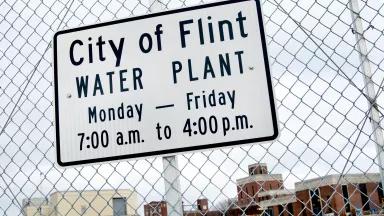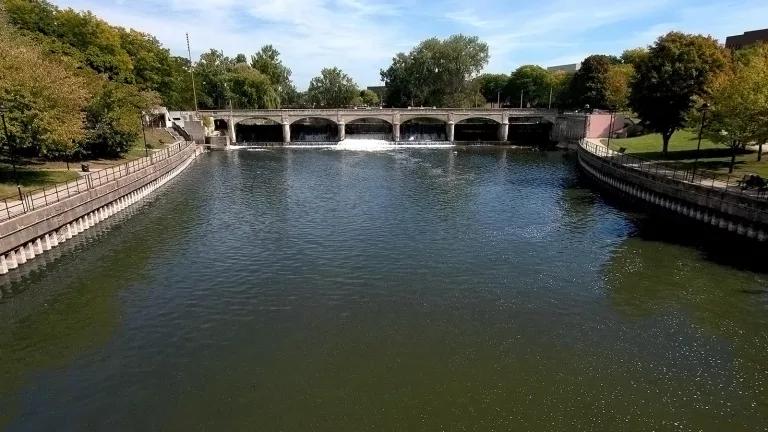
The legal filing and status updates for our lawsuit against the city of Flint and Michigan state officials.
Court Documents
- Notice of Intent to Sue Under the Safe Drinking Water Act, 42 U.S.C. § 300j-8(b)(1)(a), for Failure to Control Lead in Drinking Water in Flint, Michigan, and Failure to Assist Michigan Schools with Lead Testing and Remediation, November 16, 2015 (PDF)
- Petition for Emergency Action under the Safe Drinking Water Act, 42 U.S.C. § 300i, to Abate the Imminent and Substantial Endangerment to Flint, Michigan, Residents from Lead Contamination in Drinking Water, October 1, 2015 (PDF)
- Complaint for Declaratory and Injunctive Relief Introduction, January 27, 2016 (PDF)
- Plaintiffs’ Motion for a Preliminary Injunction, March 24, 2016 (PDF)
- Order Denying Motion to Stay Pending Appeal and Resolving Other Pending Motions, December 16, 2016 (PDF)
- Defendants State Treasurer and Members of the Flint Receivership Transition Advisory Board’s Response to Plaintiffs’ Motion for Preliminary Injunction, April 14, 2016 (PDF)
- Defendant City of Flint’s Response to Plaintiffs’ Motion for a Preliminary Injunction, April 14, 2016 (PDF)
- Opinion and Order Denying Defendants’ Motions to Dismiss, July 7, 2016 (PDF)
- Plaintiffs’ Reply Brief in Support of Motion for Preliminary Injunction, July 22, 2016 (PDF)
- City Defendants’ Post-Hearing Brief in Opposition to Motion for Preliminary Injunction, September 22, 2016 (PDF)
- State Defendants’ Closing Brief on Plaintiffs’ Motion for Preliminary Injunction, September 22, 2016 (PDF)
- Plaintiffs’ Post-Hearing Brief in Support of Motion for a Preliminary Injunction, September 22, 2016 (PDF)
- Opinion and Order Granting Plaintiffs’ Motion for Preliminary Injunction, November 10, 2016 (PDF)
- Opinion and Order Denying Motion to Stay Preliminary Injunction, December 2, 2016 (PDF)
- Settlement Agreement, March 27, 2017 (PDF)
- Index of Exhibits, March 27, 2017 (PDF)
- Stipulation as to Settlement, March 27, 2017 (PDF)
- Order Approving Settlement Agreement and Dismissing Case, March 28, 2017 (PDF)
- Plaintiffs' Motion to Enforce Settlement Agreement, December 27, 2017 (PDF)
- City Defendants’ Response to Plaintiffs' Motion to Enforce, January 17, 2018 (PDF)
- Plaintiffs' Motion to Enforce Paragraphs 29 and 30 of Flint Settlement Agreement, June 21, 2018 (PDF)
- Declaration of Stacy Woods in Support of Plaintiffs’ Motion to Enforce Paragraphs 29 and 30 of Settlement Agreement, June 21, 2018 (PDF)
- Plaintiffs' Motion to Enforce Paragraphs 38 and 117 of Flint Settlement Agreement, July 13, 2018 (PDF)
- Plaintiffs' Letter Providing Notice of Violations of Settlement Agreement, September 28, 2018 (PDF)
- Declaration of Eric M. Schwartz, Ph.D., October 1, 2018 (PDF)
- Stipulation and Notice of Agreement to Modify Terms of Flint Settlement Agreement, February 12, 2019 (PDF)
- Order Amending Flint Settlement Agreement, March 26, 2019 (PDF)
- Order Granting in Part Plaintiffs’ Third Motion to Enforce Settlement Agreement, March 27, 2019 (PDF)
- Stipulation and Notice, May 16, 2019 (PDF)
- Index of Exhibits, May 16, 2019 (PDF)
- Exhibit A, May 16, 2019 (PDF)
- Exhibit B, May 16, 2019 (PDF)
- Order Amending Settlement Agreement, May 23, 2019 (PDF)
- Stipulation and Notice, May 18, 2020 (PDF)
- Stipulation and Notice, August 13, 2020 (PDF)
- Order Modifying Settlement Agreement, August 24, 2020 (PDF)
- Plaintiffs’ Fourth Motion to Enforce Settlement Agreement, September 4, 2020 (PDF)
- Index of Appendix to Plaintiffs’ Fourth Motion to Enforce Settlement Agreement, September 4, 2020 (PDF)
- Exhibit 1: Declaration of Sarah C. Tallman, September 4, 2020 (PDF)
- Exhibit 2: Declaration of Alexander Tom, September 4, 2020 (PDF)
- Exhibit 3: Declaration of Jared Webb, September 4, 2020 (PDF)
- Plaintiffs’ Reply in Support of Fourth Motion to Enforce Settlement Agreement, September 28, 2020 (PDF)
- Order Granting Plaintiffs’ Fourth Motion to Enforce Settlement Agreement, October 13, 2020 (PDF)
- Order Amending Order Granting Plaintiffs’ Fourth Motion to Enforce Settlement Agreement, October 16, 2020 (PDF
- Stipulation and Notice, April 12, 2022 (PDF)
- Order Modifying Settlement Agreement, April 14, 2022 (PDF)
- Plaintiffs’ Fifth Motion to Enforce Settlement Agreement, November 1, 2022 (PDF)
- Index of Exhibits to Plaintiffs’ Fifth Motion to Enforce Settlement Agreement, November 1, 2022 (PDF)
- Exhibit A: Declaration of Adeline S. Rolnick, November 1, 2022 (PDF)
- Exhibit B: Declaration of Nicole Vandal, November 1, 2022 (PDF)
- Exhibit C: Plaintiffs’ Appendix, November 1, 2022 (PDF)
- City Defendants’ Response to Plaintiffs Fifth Motion to Enforce Settlement Agreement, December 14, 2022 (PDF)
- Stipulation and Notice, January 19, 2023 (PDF)
- Plaintiffs’ Reply in Support of Fifth Motion to Enforce Settlement Agreement, January 20, 2023 (PDF)
- Order Granting Plaintiffs’ Fifth Motion to Enforce Settlement Agreement, February 24, 2023 (PDF)
- Plaintiffs’ Motion for Contempt, May 26, 2023 (PDF)
- Order Granting In Part Plaintiffs’ Motion For Contempt, March 12, 2024 (PDF)
Settlement Agreement Status Reports
The city of Flint and state of Michigan are required to provide NRDC with periodic status reports to allow the parties to track the government’s progress in implementing the requirements of the settlement agreement in our case. These reports include information about the number of service lines excavated and replaced, as well as the results of recent tap water monitoring tests.
- April 28, 2017 State Status Report (PDF)
- CORE Data (XLS)
- May 5, 2017 City Status Report (PDF)
- Contract Tracking (XLS)
- Contract - Goyette Mechanical (PDF)
- Contract - Lang Constructors, Part 1 (PDF)
- Contract - Lang Constructors, Part 2 (PDF)
- Contract - Waldorf & Sons (PDF)
- Contract - WT Stevens (PDF)
- Contract - Yeager Asphalt, Part 1 (PDF)
- Contract - Yeager Asphalt, Part 2 (PDF)
- Contract - Zito Construction, Part 1 (PDF)
- Contract - Zito Construction, Part 2 (PDF)
- May 26, 2017 State Status Report (PDF)
- CORE Data (XLS)
- CORE Data, Corrected (XLS)
- Water Delivery Data, Part 1 (XLS)
- Water Delivery Data, Part 2 (XLS)
- Tap Water Monitoring Data - Sentinel Round 8 (XLS)
- Tap Water Monitoring Data - Residential Sampling Report (XLS)
- Weekly Water Quality Monitoring, Part 1 (XLS)
- Weekly Water Quality Monitoring, Part 2 (XLS)
- Weekly Water Quality Monitoring, Part 3 (XLS)
- May 2, 2017 Letter from MDEQ to EPA re: Loan Forgiveness (PDF)
- May 3, 2017 Letter to Flint from MDOT re: Stewart Avenue (PDF)
- May 4, 2017 Letter from EPA to Flint re Long Term Drinking Water Sources (PDF)
- May 8, 2017 MDEQ Supplemental Finding of No Significant Impact for Flint Service Line Replacement Project (PDF)
- May 16, 2017 Drinking Water Revolving Fund Order of Approval, City of Flint (PDF)
- May 18, 2017 Letter to MDOT from Flint re Stewart Avenue (PDF)
- Monthly Operation Report of Treatment Plant, April (PDF)
- Monthly Operation Report of Treatment Plant, May (PDF)
- May 30, 2017 City Status Report (PDF)
- August 28, 2017 State Status Report (PDF)
- CORE Data (XLS)
- Water Delivery Data, Part 1 (XLS)
- Water Delivery Data, Part 2 (XLS)
- Tap Water Monitoring Data - CLEAR Round 2 (XLS)
- Tap Water Monitoring Data - CLEAR Round 3 (XLS)
- Tap Water Monitoring Data - Extended Sentinel Round 9 (XLS)
- Tap Water Monitoring Data - Extended Sentinel Round 10 (XLS)
- Tap Water Monitoring Data - LCRI Round 1 (XLS)
- Tap Water Monitoring Data - Residential Sampling Report (XLS)
- June 16, 2017 Letter EPA to MDEQ re: Operational Status of Flint Drinking Water Treatment Plant (PDF)
- July 14, 2017 Supplemental DWSRF Capitalization Grant Quarterly Report (PDF)
- July 25, 2017 Letter EPA to MDEQ re: Lead and Copper Compliance Data (PDF)
- August 01, 2017 Letter EPA to MDEQ re: DWSRF Debt Forgiveness (PDF)
- August 10, 2017 Letter EPA to Mayor Weaver and MDEQ re: Staffing Concerns Flint Public Water System (PDF)
- Monthly Operation Report for Water Treatment Plant, May 2017 (PDF)
- Monthly Operation Report for Water Treatment Plant, June 2017 (PDF)
- Monthly Operation Report for Water Treatment Plant, July 2017 (PDF)
- Monthly Operation Report for Water Treatment Plant, Weekly Update for August 16, 2017 (PDF)
- Weekly Enhanced Water Quality Parameter Monitoring SA Report 3, August 16, 2017 (XLS)
- August 30, 2017 City Status Report (PDF)
- Lead Service Line Replacement Data (XLS)
- Activity Report (PDF)
- VASLR Visits List (XLS)
- November 28, 2017 City Status Report (PDF)
- November 28, 2017 State Status Report (PDF)
- CORE Data (XLS)
- Water Delivery Data, Part 1 (XLS)
- Water Delivery Data, Part 2 (XLS)
- Tap Water Monitoring Data - CLEAR Round 4 (XLS)
- Tap Water Monitoring Data - CLEAR Round 5 (XLS)
- Tap Water Monitoring Data - CLEAR Round 6 (XLS)
- Tap Water Monitoring Data - LCRI Round 2 (XLS)
- Tap Water Monitoring Data - LCRI Round 3 (XLS)
- Tap Water Monitoring Data - Residential Sampling Report (XLS)
- Tap Water Monitoring Data - Flint DEQ Report to EPA, July through November, 2017 (XLS)
- Judgment in MDEQ v. City of Flint, 17-cv-12107 (E.D. Mich.) (PDF)
- Opinion and Order in MDEQ v. City of Flint, 17-cv-12107 (E.D. Mich.) (PDF)
- August 18, 2017 Letter from Mayor Weaver to EPA response to August 10 Letter (PDF)
- September 14, 2017 Letter EPA to Mayor Weaver and MDEQ Follow-up re: August 23 Meeting on Emergency Order (PDF)
- September 22, 2017 Letter Mayor Weaver to EPA Response to September 14 Letter (PDF)
- September 30, 2017 Supplemental DWSRF Capitalization Grant Quarterly Report (PDF)
- Monthly Operation Report for Water Treatment Plant, August 2017 (PDF)
- Monthly Operation Report for Water Treatment Plant, September 2017 (PDF)
- Monthly Operation Report for Water Treatment Plant, October 2017 (PDF)
- Monthly Operation Report for Water Treatment Plant, Weekly Update for November 15, 2017 (PDF)
- Weekly Enhanced Water Quality Parameter Monitoring, November 15, 2017 (XLS)
- February 20, 2018 State Status Report (PDF)
- CORE Data (XLS)
- Tap Water Monitoring Data - CLEAR Round 7 (XLS)
- Tap Water Monitoring Data - Residential Sampling Report (XLS)
- December 7, 2017 Letter EPA to Mayor Weaver and MDEQ re: DWSRF/WIIN Spending (PDF)
- December 11, 2017 Letter MDEQ to EPA re: DWSRF/WIIN Spending (PDF)
- December 12, 2017 Letter EPA to Mayor Weaver and MDEQ re: Emergency Order (PDF)
- December 13, 2017 Letter MDEQ to City of Flint re: Interim Water Quality Parameters (PDF)
- December 20, 2017 Letter MDEQ to EPA re: Emergency Order (PDF)
- January 8, 2018 Letter Mayor Weaver to EPA re: December 12 Letter (PDF)
- February 9, 2018 MDEQ Finding of No Significant Impact, Service Line Replacement Project (PDF)
- Monthly Operation Report for Water Treatment Plant, November 2017 (PDF)
- Monthly Operation Report for Water Treatment Plant, December 2017 (PDF)
- Monthly Operation Report for Water Treatment Plant, January 2018 (PDF)
- Monthly Operation Report for Water Treatment Plant, Weekly Update for February, 2018 (PDF)
- February 27, 2018 City Status Report (PDF)
- City of Flint Status Report under Settlement Agreement, August 28, 2018 (PDF)
- City of Flint Status Report under Settlement Agreement, November 28, 2018 (PDF)
- City of Flint Status Report under Settlement Agreement, February 28, 2019 (PDF)
- City of Flint Status Report under Settlement Agreement, May 31, 2019 (PDF)
- May 22, 2018 State Status Report (PDF)
- CORE Data Report (XLS)
- CORE Refused Visits (XLS)
- Residential Sampling Report (XLS)
- Test Results for Flint DEQ Reports to EPA (XLS)
- Quarterly WIIN Report, Jan-March (PDF)
- EPA Program Evaluation Report for WIIN Act Funding (PDF)
- Finding of No Significant Impact Amendment (PDF)
- LCRI 2018 Round 1 Results with SL Material (XLS)
- RTCR Monitoring Plan (PDF)
- May 25, 2018 City Status Report (PDF)
- August 28, 2018 City Status Report (PDF)
- FAST Service Line Replacement Data (XLS)
- DPW LCR Sampling (XLS)
- August 28, 2018 State Status Report (PDF)
- CORE Data Report (XLS)
- CORE Refused Visits (XLS)
- Residential Sampling Report (XLS)
- Quarterly WIIN Report, March-Jun (PDF)
- WIIN Intended Use Plan, DEQ to EPA (PDF)
- OAG Performance Audit Report (PDF)
- LCRI 2018 Round 2 Results (XLS)
- LCR Data for Jan 1-June 30, 2018 (XLS)
- November 28, 2018 City Status Report (PDF)
- Distribution Titrations, September (PDF)
- Distribution Testing, November (PDF)
- Distribution Titrations, November (PDF)
- City of Flint Water Plant Distribution Sampling, November (PDF)
- FAST Service Line Replacement Data (XLS)
- Filter Verification Report (XLS)
- Correspondence, Michigan DEQ to City of Flint (PDF)
- City of Flint Reimbursement Report (XLS)
- November 28, 2018 State Status Report (PDF)
- CORE Data Report (XLS)
- CORE Refused Visits (XLS)
- Residential Sampling Report (XLS)
- February 25, 2019 State Status Report (PDF)
- CORE Data Report (XLS)
- CORE Refused Visits (XLS)
- Residential Sampling Report (XLS)
- Quarterly WIIN Report, December (PDF)
- WIIN Funding Order of Approval (PDF)
- DEQ DWRF WIIN Schedule (PDF)
- Monthly Operation Report for Water Treatment Plant, December 2018 (PDF)
- Monthly Operation Report for Water Treatment Plant, Weekly Update for February, 2019 (PDF)
- Quarterly Water Quality Parameter Monitoring (PDF)
- February 28, 2019 City Status Report (PDF)
- April 2, 2019 City Status Report (PDF)
- April 29, 2019 City Status Report (PDF)
- May 30, 2019 State Status Report (PDF)
- CORE Data Report (XLS)
- CORE Refused Visits (XLS)
- Residential Sampling Report (XLS)
- Quarterly WIIN Report, March (PDF)
- Integrity Oversight Monitor Report, March 2019 (PDF)
- May 31, 2019 City Status Report (PDF)
- FAST Service Line Replacement Data (XLS)
- FAST Financial Tracking (PDF)
- City of Flint Reimbursement Report (XLS)
- Residential Parcel ID Numbers (XLS)
- Residential Sampling Reports (PDF)
- Reporting Certification Form (PDF)
- Lang Constructors Contract, Part 1 (PDF)
- Lang Constructors Contract, Part 2 (PDF)
- Rowe Professional Services Contract (PDF)
- WT Stevens Contract (PDF)
- June 28, 2019 City Status Report (PDF)
- Reporting Certification Form (PDF)
- FAST Start Exploration Status (XLS)
- Consent Attempts (XLS)
- July 29, 2019 City Status Report (PDF)
- Reporting Certification Form (PDF)
- FAST Start Exploration Status (XLS)
- Consent Attempts (XLS)
- August 28, 2019 State Status Report
- EPA Staffing Concerns Letter June 26, 2019 (PDF)
- Final Water Quality Parameter Letter June 6, 2019 (PDF)
- H4H CORE Program (XLS)
- Legislative Spending Summary June 7, 2019 (PDF)
- Report August 2019 (PDF)
- Residential Sampling Report (XLS)
- SHPO Zone letter June 18, 2019 (PDF)
- Violation Notice LCR Monitoring August 16, 2019 (PDF)
- August 28, 2019 City Status Report
- City of Flint Quarterly Status Report (PDF)
- DBP Copy August 2019 (PDF)
- FAST Financial Tracking (PDF)
- FAST Report (XLS)
- Flint LCR 2nd half 2019 (PDF)
- Flint LCR August 28 2019 (PDF)
- Quarterly Report - Weekly Sampling Data (PDF)
- Reimbursement Report (XLS)
- December 2, 2019 State Status Report
- EGLE to Flint re LCR Monitoring Aug 23 2019 (PDF)
- H4H CORE Program SA Reporting (XLS)
- LCR Sampling Results Jan-June 2019 (PDF)
- Legislative Report on WIIN Sept 6 2019 (PDF)
- Neeley from EGLE re TMF Nov 14 2019 (PDF)
- Public Notification Doc Sept 27 2019 (PDF)
- Quarterly WIIN Report June 2019 (PDF)
- Quarterly WIIN Report Sept 2019 (PDF)
- Report November 2019 (PDF)
- Residential Sampling Report (XLS)
- Response from Flint re Violation Notice LCR Aug 21 2019 (PDF)
- Updated Status of Violation Notice Sept 27 2019 (PDF)
- December 2, 2019 City Status Report
- City of Flint Quarterly Status Report (PDF)
- FAST Financial Tracking (PDF)
- FAST Report (XLS)
- Reimbursement Report (XLS)
- February 24, 2020 State Status Report
- Flint LCR Report Revised 2 20 2020 (PDF)
- Flint Supplemental Quarterly Report December 2019 (PDF)
- H4H CORE Program SA Reporting (XLS)
- Letter from EGLE Oswald to Flint Bincsik (PDF)
- Letter from EGLE Oswald to Flint Wheeler (PDF)
- Letter from Flint Bincsik to EGLE Oswald (PDF)
- Letter from Flint Wheeler to EGLE Oswald (PDF)
- Letter to City Bincsik from EGLE Oswald (PDF)
- Letter to EGLE Oswald from City Bincsik (PDF)
- Report February 2020 (PDF)
- Residential Sampling Report (XLS)
- WIIN Report Dec 2019 (XLS)
- March 2, 2020 City Status Report
- City of Flint Quarterly Status Report (PDF)
- Reimbursement Report (XLS)
- SLR Financial Tracking (XLS)
- SLR Report (XLS)
- June 3, 2020 State Status Report
- July 9, 2020 City Status Report
- Filter Verification Data (XLS)
- Reimbursement Requests (PDF)
- SLR Activity Data (XLS)
- State Reimbursement Data (XLS)
- August 28, 2020 State Status Report
- August 28, 2020 City Status Report
- City of Flint Quarterly Status Report (PDF)
- Reimbursement Report (XLS)
- SLR Financial Tracking (PDF)
- SLR Report (XLS)
- November 24, 2020 State Status Report
- Letter from EGLE Oswald to Flint Bincsik (PDF)
- Letter from EGLE Oswald to Flint Edwards (PDF)
- Letter from EGLE Oswald to Flint Neeley (PDF)
- Letter from Flint Bincsik to EGLE Oswald (PDF)
- Letter to Flint Edwards from EGLE Oswald (PDF)
- Public Notification Document (PDF)
- Quarterly Report Aug-Nov 2020 (PDF)
- Residential Sampling Report (XLS)
- WIIN Act - City of Flint Legis. Report 9-11-20 (PDF)
- December 1, 2020 City Status Report
- City of Flint Quarterly Status Report (PDF)
- Restoration Report (PDF)
- SLR Data (XLS)
- SLR Reimbursement (XLS)
- February 19, 2021 City Status Report
- February 24, 2021 State Quarterly Report
- April 1, 2021 City Status Report
- April 7, 2021 City Status Report
- Consent Attempts (XLS)
- May 13, 2021 City Status Report
- City of Flint Status Report (PDF)
- Consent Attempts (XLS)
- Declinations (XLS)
- Exploration Status (XLS)
- Homes with Consent Received (XLS)
- NRDC Outreach List with Rowe-City Data (XLS)
- May 24, 2021 State Status Report
- June 2, 2021 City Partial Quarterly Report
- City of Flint Quarterly Status Report (PDF)
- Phase 5 Restoration (PDF)
- Phase 6 Restoration (PDF)
- June 10, 2021 City Quarterly Report
- City of Flint Quarterly Status Report – Supplemented (PDF)
- Consent Attempts (XLS)
- SLR Report (XLS)
- July 14, 2021 City Status Report
- Consent Attempts (XLS)
- Declinations (XLS)
- Homes with Consent Received (XLS)
- Non-responsive (XLS)
- Restoration Addresses (XLS)
- SL Exploration Status (XLS)
- August 16, 2021 City Status Report
- City of Flint July Status Report (PDF)
- Declinations (XLS)
- Homes with Consent Received (XLS)
- Non-responsive (XLS)
- Scheduling Attempts (XLS)
- SL Exploration Status (XLS)
- August 24, 2021 State Quarterly Report
- EPA Letter, June 15, 2021 (PDF)
- EPA Letter, July 21, 2021 (PDF)
- Flint Harris EPA R5 Performance Period Response Follow up, August 6, 2021 (PDF)
- Flint Harris EPA R5 Performance Period Response Follow up, August 16, 2021 (PDF)
- Flint Neeley LCR Monitoring Jan-June 2021, Corrected (PDF)
- Flint Performance Period Letter (PDF)
- Quarterly Report May-Aug 2021 (PDF)
- Residential Sampling Report 051921 through 081821 (XLS)
- Response to EPA Correspondence (PDF)
- WIIN Act, City of Flint Legislative Report (PDF)
- September 20, 2021 City Quarterly Report
- Declinations (XLS)
- Fast Start Exploration Status (XLS)
- Filter Verification (XLS)
- October 13, 2021 City Status Report
- November 17, 2021 State Quarterly Report
- City of Flint Legislative Report (PDF)
- City of Flint Pipe Misalignment (PDF)
- EPA Action SLR Letter (PDF)
- EPA Update SLR (PDF)
- Quarterly Report (PDF)
- Residential Sampling Report (XLS)
- February 25, 2022 State Quarterly Report
- May 20, 2022 State Quarterly Report
- EPA Letter Apr 22, 2022 SLR (PDF)
- Flint TMF Update Mar 2022 (PDF)
- Residential Sampling Report (XLS)
- Quarterly Report Feb-May 2022 (PDF)
- August 25, 2022 State Quarterly Report
- August 29, 2022 City Quarterly Report
- September 28, 2022 City Monthly Status Report
- October 28, 2022 City Monthly Status Report
- November 28, 2022 City Quarterly Status Report
- December 28, 2022 City Monthly Status Report
- January 27, 2023 City Monthly Status Report
- February 14, 2023 City Monthly Status Report
- 1313 Cleveland Ave (1) (PDF)
- 2937 Concord 2023 (1) (PDF)
- 2023-2-14 Declinations (XLS)
- 2023-02-14 Exploration Status (XLS)
- 2023-02-14 Homes with Consent (XLS)
- 2023-02-14 Outreach Attempts (XLS)
- 2023-2-14 Fast Start Exploration Status (XLS)
- 2023-02-28 CoF Quarterly Status Report (PDF)
- Flint VII SLE-SLR Sept_Restoration Invoice 01 (PDF)
- Flint Fast Start Phase VII SLE-SLR Invoice 02 (PDF)
- Invoice FINAL - PA4 (PDF)
- Total Invoice 3 12-15-22 (PDF)
- March 28, 2023 City Monthly Status Report
- 2023-03-14 Declinations (XLS)
- 2023-03-14 Exploration Status (XLS)
- 2023-03-14 Homes with Consent (XLS)
- 2023-03-14 Outreach Attempts (XLS)
- 2023-03-14 Restoration (XLS)
- 2023-03-28 CoF Status Report (PDF)
- Flint Service Line Replacement Plan Updated 03-28-2023 (PDF)
- Flint Service Line Restoration Plan Updated 03-28-2023 (PDF)
- April 28, 2023 City Monthly Status Report
- May 25, 2023 City Monthly Status Report
- June 29, 2023 City Monthly Status Report
- July 30, 2023 City Monthly Status Report
- August 28, 2023 City Monthly Status Report
- September 28, 2023 City Monthly Report
- October 31, 2023 City Monthly Report
- November 28, 2023 City Quarterly Report
- December 19, 2023 City Monthly Report
Independent Monitoring Program
As a result of the lawsuit, the court established a third-party Independent Monitoring program to conduct tap water testing for lead at an additional 100 homes in Flint. The settlement funds this testing for at least two six-month periods. This program is managed by Dr. Susan Masten, a Professor of Civil and Environmental Engineering at Michigan State University. The documents on this page include Dr. Masten’s resume, a brochure distributed to residents describing the program, and the data from her testing.
Related documents
In a civil action filed by Flint, Michigan, residents against the U.S. Environmental Protection Agency (EPA) over its role in the Flint water crisis, Burgess v. EPA [Civil Action No. 5:16-cv-10444-JEL-MKM], Erik D. Olson, NRDC’s senior strategic director for health, filed a declaration in his personal capacity.
Burgess v. EPA was filed under the Federal Tort Claims Act by Flint residents seeking damages from the federal government. The lawsuit is separate from Concerned Pastors for Social Action v. Khouri—the Safe Drinking Water Act citizen suit filed on behalf of Flint residents by NRDC that seeks, among other remedies, to clean up the city’s tap water, remove lead pipes, and provide an alternative source of safe drinking water.
In his declaration, linked above, Olson wrote: “…it is my conclusion that if the EPA had been engaging in appropriate oversight of the Michigan Department of Environmental Quality (MDEQ) and Flint, as required by the [Safe Drinking Water Act] and EPA’s regulations, the agency would have identified the serious problems with Flint’s water, the failure to maintain optimized corrosion control, and the need for enforcement action far earlier than when it finally issued an administrative order in January 2016. The agency should have taken enforcement action likely by mid-2014 but certainly no later than April 2015.”




